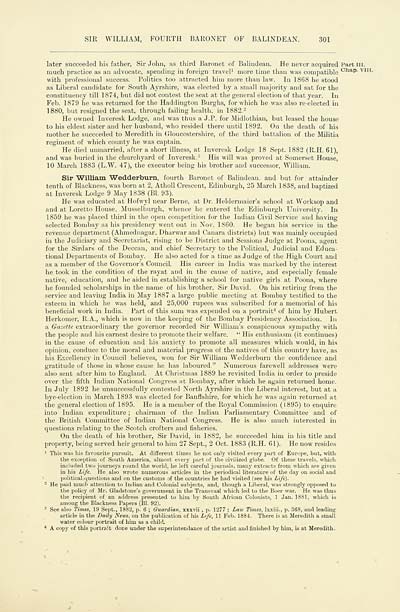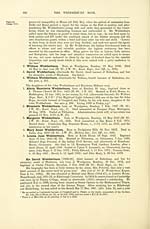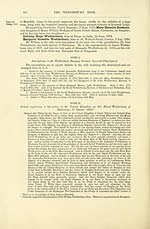Wedderburn book > History
(421) Page 301
Download files
Complete book:
Individual page:
Thumbnail gallery: Grid view | List view

SIR WILLIAM, FOURTH BARONET OF BALINDEAN. 301
later succeeded his father, Sir John, as third Baronet of Balindean. He never acquired Part in.
much practice as an advocate, spending in foreign travel 1 more time than was compatible cha P- VUI -
with professional success. Politics too attracted him more than law. In 1868 he stood
as Liberal candidate for South Ayrshire, was elected by a small majority and sat for the
constituency till 1874, but did not contest the seat at the general election of that year. In
Feb. 1879 he was returned for the Haddington Burghs, for which he was also re-elected in
1880, but resigned the seat, through failing health, in 1882. 2
He owned Inveresk Lodge, and was thus a J. P. for Midlothian, but leased the house
to his eldest sister and her husband, who resided there until 1892. On the death of his
mother he succeeded to Meredith in Gloucestei-shire, of the third battalion of the Militia
regiment of which county he was captain.
He died unmarried, after a short illness, at Inveresk Lodge 18 Sept. 1882 (R.H. 61),
and was buried in the churchyard of Inveresk. 3 His will was proved at Somerset House,
10 March 1883 (L.W. 47), the executor being his brother and successor, William.
Sir William Wedderburn, fourth Baronet of Balindean. and but for attainder
tenth of Blackness, was born at 2, Atholl Crescent, Edinburgh, 25 March 1838, and baptized
at Inveresk Lodge 9 May 1838 (Bl. 93).
He was educated at Hofwyl near Berne, at Dr. Heldermaier's school at Worksop and
and at Loretto House, Musselburgh, whence he entered the Edinburgh University. In
1859 he was placed third in the open competition for the Indian Civil Service and having
selected Bombay as his presidency went out in Nov. 1860. He began his service in the
revenue department (Ahmednagar, Dharwar and Cauara districts) but was mainly occupied
in the Judiciary and Secretariat, rising to be District and Sessions Judge at Poona, agent
for the Sirdars of the Deccan, and chief Secretary to the Political, Judicial and Educa-
tional Departments of Bombay. He also acted for a time as Judge of the High Court and
as a member of the Governor's Council. His career in India was marked by the interest
he took in the condition of the rayat and in the cause of native, and especially female
native, education, and he aided in establishing a school for native girls at Poona, where
he founded scholarships in the name of his brother, Sir David. On his retiring from the
service and leaving India in May 1887 a large public meeting at Bombay testified to the
esteem in which he was held, and 25,000 rupees was subscribed for a memorial of his
beneficial work in India. Part of this sum was expended on a portrait 4 of him by Hubert
Herkomer, R.A., which is now in the keeping of the Bombay Presidency Association. In
a Gazette extraordinary the governor recorded Sir William's conspicuous sympathy with
the people and his earnest desire to promote their welfare. " His enthusiasm (it continues)
in the cause of education and his anxiety to promote all measures which would, in his
opinion, conduce to the moral and material progress of the natives of this country have, as
his Excellency in Council believes, won for Sir William Wedderburn the confidence and
gratitude of those in whose cause he has laboured." Numerous farewell addresses were
also sent after him to England. At Christmas 1889 he revisited India in order to preside
over the fifth Indian National Congress at Bombay, after which he again returned home.
In July 1892 he unsuccessfully contested North Ayrshire in the Liberal interest, but at a
bye-election in March 1893 was elected for Banffshire, for which he was again returned at
the general election of 1895. He is a member of the Royal Commission ( 1895) to enquire
into Indian expenditure ; chairman of the Indian Parliamentary Committee and of
the British Committee of Indian National Congress. He is also much interested in
questions relating to the Scotch crofters and fisheries.
On the death of his brother, Sir David, in 1882, he succeeded him in his title and
property, being served heir general to him 27 Sept., 2 Oct. 1883 (R.H. 61). He now resides
' This was his favourite pursuit. At different times he not only visited every part of Europe, but, with
the exception of South America, almost every part of the civilized globe. Of these travels, which
included two journeys round the world, he left careful journals, many extracts from which are given
in his Life. He also wrote numerous articles in the periodical literature of the day on social and
political cpaestions and on the customs of the countries he had visited (see his Life).
2 He paid much attention to Indian and Colonial subjects, and, though a Liberal, was strongly opposed to
the policy of Mr. Gladstone's government in the Transvaal which led to the Boer war. He was thus
the recipient of an address presented to him by South African Colonists, 1 Jan. 1881, which is
among the Blackness Papers (Bl. 92).
3 See also Times, 19 Sept., 1882, p. 6 ; Guardian, xxxvii , p. 1277 ; Law Times, lxxiii., p. 368, and leading
article in the Daily News, on the publication of his Life, 11 Feb. 1884. There is at Meredith a smaU
water colour portrait of him as a child.
4 A copy of this portrait done under the superintendance of the artist and finished by him, is at Meredith.
later succeeded his father, Sir John, as third Baronet of Balindean. He never acquired Part in.
much practice as an advocate, spending in foreign travel 1 more time than was compatible cha P- VUI -
with professional success. Politics too attracted him more than law. In 1868 he stood
as Liberal candidate for South Ayrshire, was elected by a small majority and sat for the
constituency till 1874, but did not contest the seat at the general election of that year. In
Feb. 1879 he was returned for the Haddington Burghs, for which he was also re-elected in
1880, but resigned the seat, through failing health, in 1882. 2
He owned Inveresk Lodge, and was thus a J. P. for Midlothian, but leased the house
to his eldest sister and her husband, who resided there until 1892. On the death of his
mother he succeeded to Meredith in Gloucestei-shire, of the third battalion of the Militia
regiment of which county he was captain.
He died unmarried, after a short illness, at Inveresk Lodge 18 Sept. 1882 (R.H. 61),
and was buried in the churchyard of Inveresk. 3 His will was proved at Somerset House,
10 March 1883 (L.W. 47), the executor being his brother and successor, William.
Sir William Wedderburn, fourth Baronet of Balindean. and but for attainder
tenth of Blackness, was born at 2, Atholl Crescent, Edinburgh, 25 March 1838, and baptized
at Inveresk Lodge 9 May 1838 (Bl. 93).
He was educated at Hofwyl near Berne, at Dr. Heldermaier's school at Worksop and
and at Loretto House, Musselburgh, whence he entered the Edinburgh University. In
1859 he was placed third in the open competition for the Indian Civil Service and having
selected Bombay as his presidency went out in Nov. 1860. He began his service in the
revenue department (Ahmednagar, Dharwar and Cauara districts) but was mainly occupied
in the Judiciary and Secretariat, rising to be District and Sessions Judge at Poona, agent
for the Sirdars of the Deccan, and chief Secretary to the Political, Judicial and Educa-
tional Departments of Bombay. He also acted for a time as Judge of the High Court and
as a member of the Governor's Council. His career in India was marked by the interest
he took in the condition of the rayat and in the cause of native, and especially female
native, education, and he aided in establishing a school for native girls at Poona, where
he founded scholarships in the name of his brother, Sir David. On his retiring from the
service and leaving India in May 1887 a large public meeting at Bombay testified to the
esteem in which he was held, and 25,000 rupees was subscribed for a memorial of his
beneficial work in India. Part of this sum was expended on a portrait 4 of him by Hubert
Herkomer, R.A., which is now in the keeping of the Bombay Presidency Association. In
a Gazette extraordinary the governor recorded Sir William's conspicuous sympathy with
the people and his earnest desire to promote their welfare. " His enthusiasm (it continues)
in the cause of education and his anxiety to promote all measures which would, in his
opinion, conduce to the moral and material progress of the natives of this country have, as
his Excellency in Council believes, won for Sir William Wedderburn the confidence and
gratitude of those in whose cause he has laboured." Numerous farewell addresses were
also sent after him to England. At Christmas 1889 he revisited India in order to preside
over the fifth Indian National Congress at Bombay, after which he again returned home.
In July 1892 he unsuccessfully contested North Ayrshire in the Liberal interest, but at a
bye-election in March 1893 was elected for Banffshire, for which he was again returned at
the general election of 1895. He is a member of the Royal Commission ( 1895) to enquire
into Indian expenditure ; chairman of the Indian Parliamentary Committee and of
the British Committee of Indian National Congress. He is also much interested in
questions relating to the Scotch crofters and fisheries.
On the death of his brother, Sir David, in 1882, he succeeded him in his title and
property, being served heir general to him 27 Sept., 2 Oct. 1883 (R.H. 61). He now resides
' This was his favourite pursuit. At different times he not only visited every part of Europe, but, with
the exception of South America, almost every part of the civilized globe. Of these travels, which
included two journeys round the world, he left careful journals, many extracts from which are given
in his Life. He also wrote numerous articles in the periodical literature of the day on social and
political cpaestions and on the customs of the countries he had visited (see his Life).
2 He paid much attention to Indian and Colonial subjects, and, though a Liberal, was strongly opposed to
the policy of Mr. Gladstone's government in the Transvaal which led to the Boer war. He was thus
the recipient of an address presented to him by South African Colonists, 1 Jan. 1881, which is
among the Blackness Papers (Bl. 92).
3 See also Times, 19 Sept., 1882, p. 6 ; Guardian, xxxvii , p. 1277 ; Law Times, lxxiii., p. 368, and leading
article in the Daily News, on the publication of his Life, 11 Feb. 1884. There is at Meredith a smaU
water colour portrait of him as a child.
4 A copy of this portrait done under the superintendance of the artist and finished by him, is at Meredith.
Set display mode to:
![]() Universal Viewer |
Universal Viewer | ![]() Mirador |
Large image | Transcription
Mirador |
Large image | Transcription
Images and transcriptions on this page, including medium image downloads, may be used under the Creative Commons Attribution 4.0 International Licence unless otherwise stated. ![]()
| Histories of Scottish families > Wedderburn book > History > (421) Page 301 |
|---|
| Permanent URL | https://digital.nls.uk/95655771 |
|---|
| Attribution and copyright: |
|
|---|---|
| Description | A selection of almost 400 printed items relating to the history of Scottish families, mostly dating from the 19th and early 20th centuries. Includes memoirs, genealogies and clan histories, with a few produced by emigrant families. The earliest family history goes back to AD 916. |
|---|

